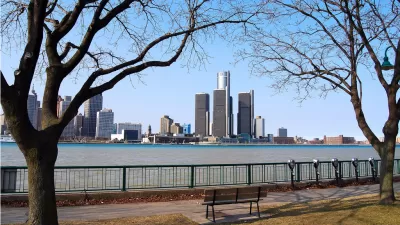The Detroit Future City Implementation Office has completed a new strategic plan that will redirect the organizations revitalization efforts, four years after the city adopted the largely successful Detroit Future City framework.

The Detroit Future City framework was adopted with great fanfare in 2013 as a strategy for Detroit to achieve economic growth while dealing with the effects of a population that had spent decades in decline.
According to an article by John Gallagher, Detroit Future City now finds itself at a bit of a crossroads. "[T]he framework's bold visions of repurposing Detroit's vacant and abandoned land in new and innovative ways has been widely accepted as a goal, if not yet actually accomplished on the ground," and the time has come again to plan for the future. Specifically, "the Detroit Future City Implementation Office, the entity set up to translate the guiding principles of the DFC framework into practice, has completed its strategic plan, a road map of where the office plans to go."
According to Gallagher, the new strategic plan directs the Detroit Future City Implementation Office toward continued efforts in neighborhood revival, a shift toward a rental market, where once homeownership dominated the landscape, and a new focus on the 900 or so vacant industrial sites in Detroit.
To put a public face on the next phase of Detroit Future City, the Implementation Office is preparing to launch a new website (launching on Monday at detroitfuturecity.com). Gallagher also speaks with Anika Goss-Foster, the executive director of the Detroit Future City Implementation Office, to get more insider's information on the new strategic plan.
FULL STORY: See what's in Detroit Future City's strategic plan

Alabama: Trump Terminates Settlements for Black Communities Harmed By Raw Sewage
Trump deemed the landmark civil rights agreement “illegal DEI and environmental justice policy.”

Planetizen Federal Action Tracker
A weekly monitor of how Trump’s orders and actions are impacting planners and planning in America.

Why Should We Subsidize Public Transportation?
Many public transit agencies face financial stress due to rising costs, declining fare revenue, and declining subsidies. Transit advocates must provide a strong business case for increasing public transit funding.

New California Law Regulates Warehouse Pollution
A new law tightens building and emissions regulations for large distribution warehouses to mitigate air pollution and traffic in surrounding communities.

Phoenix Announces Opening Date for Light Rail Extension
The South Central extension will connect South Phoenix to downtown and other major hubs starting on June 7.

How Housing as a Financial Product Harms Communities
Institutional buyers who treat housing as an investment product become disconnected from the impacts of higher rents, displacement, and housing instability.
Urban Design for Planners 1: Software Tools
This six-course series explores essential urban design concepts using open source software and equips planners with the tools they need to participate fully in the urban design process.
Planning for Universal Design
Learn the tools for implementing Universal Design in planning regulations.
Caltrans
Smith Gee Studio
Institute for Housing and Urban Development Studies (IHS)
City of Grandview
Harvard GSD Executive Education
Toledo-Lucas County Plan Commissions
Salt Lake City
NYU Wagner Graduate School of Public Service





























